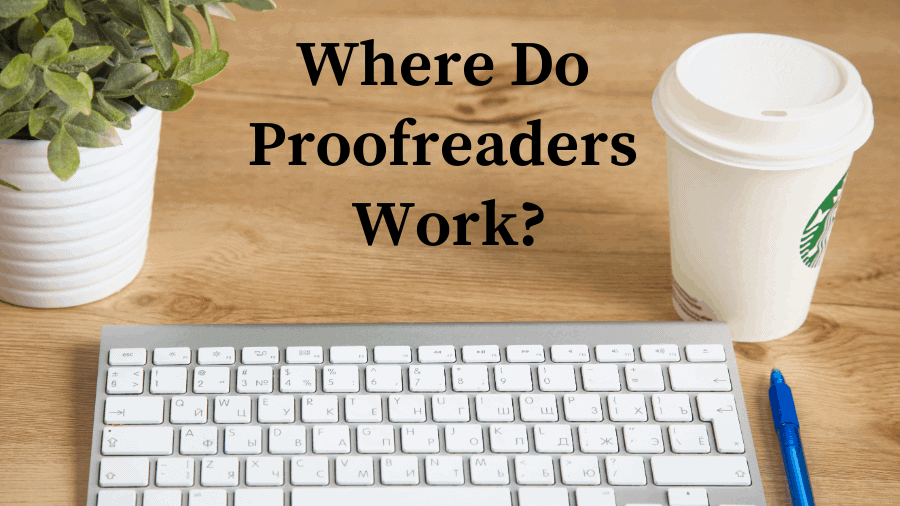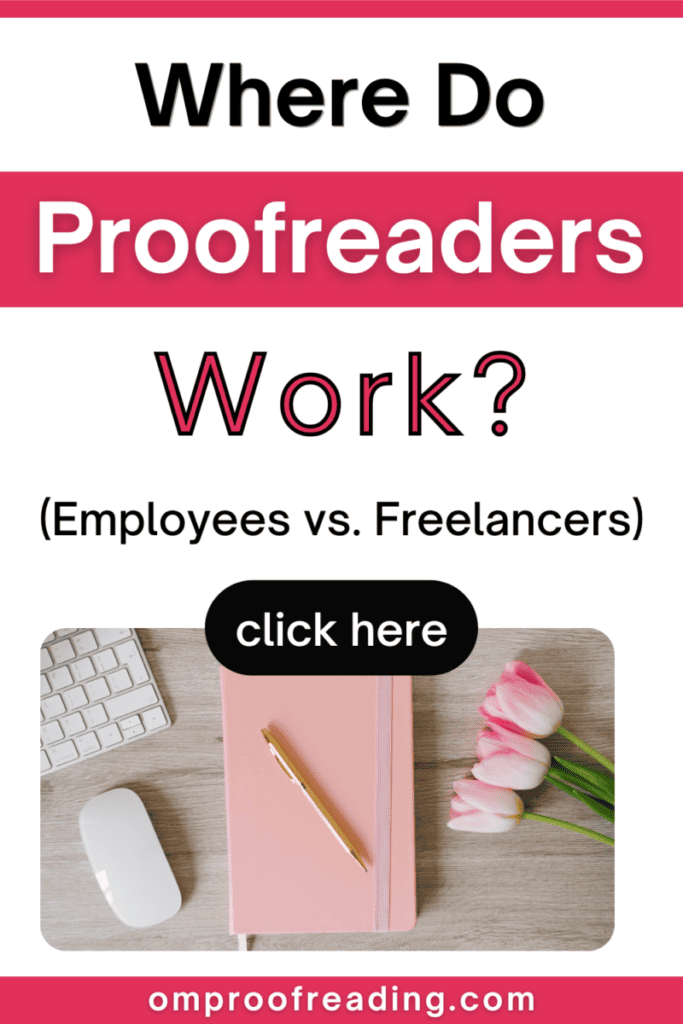This article may contain affiliate links. Please see our affiliate disclaimer in the footer menu for more information. Thank you for your support!

You know there are proofreaders in this world, but where do all those elusive proofreaders work?
Where proofreaders work depends on whether they are employees or freelancers. When I became a proofreader, I had to decide whether to work for a company or be self-employed; I chose self-employment.
Proofreaders work on-site as employees at many businesses, such as marketing firms, employment agencies, and publishing companies. They also work remotely as freelancers from home offices, coworking spaces, and coffee shops.
Let’s discover the wide array of places where employed and freelance proofreaders work.
Where Do Proofreaders Work?
Proofreaders work in a variety of locations.
Employed proofreaders typically work on-site at businesses. In contrast, freelance proofreaders (and independent contractors) can choose where to put their eagle eyes to work.
The main difference between freelancers and independent contractors is that projects taken on by independent contractors are generally broader in scope and longer in duration than those taken on by freelancers.
However, since their roles are similar, I’ll use the word freelancer to refer to freelancers and independent contractors.
Let’s learn more about where proofreaders work.
Since working on-site as an employee is fairly straightforward, this article will focus on freelancers.
Freelancing can particularly benefit moms and dads who have little ones at home.
I penned a post about how to become a proofreader in ten steps if you’d like to check it out.
Om Proofreading also has an article about the skills required to be a proofreader.
Proofreaders Work On-Site at Companies as Employees
Any business that produces content can benefit from having a proofreader polish their documents and eliminate unsightly errors.
The Kinds of Companies Where Proofreaders Work
Many businesses need a proofreader on their team. Here are a few examples of businesses that can benefit from hiring a proofreader:
- employment agencies
- advertising and marketing companies
- firms within the motion picture and video production industry
- organizations in the professional, scientific, and technical services industries
Finally, some proofreaders decide to work at publishing companies, which is a bit different from working at most other businesses. We’ll talk about that soon.
What Kinds of Texts Do These Companies Need Proofreading For?
- nondisclosure agreements
- employment contracts
- partnership agreements
- emails
- newsletters
- user manuals
- screenplays
- website content
- social media posts
- taglines
Some Proofreaders Work at Publishing Companies
Some proofreaders work for a particular kind of company—a publishing company.
What exactly is meant by the term publishing?
Traditionally, the term refers to the creation and distribution of printed works, such as books, newspapers, and magazines. With the advent of digital information systems, the scope has expanded to include digital publishing such as ebooks, digital magazines, websites, social media, music, and video game publishing.
– Wikipedia
You may be familiar with the “Big Five” trade book publishers in the US:

Proofreaders who enjoy long-term projects may be well suited to work at a publishing house.
The publishing industry is quite competitive, but with enough know-how and networking, they may be able to get their foot in the door.
Suppose they can’t get into a publishing company due to steep competition. In that case, they can connect with self-publishing authors on freelance platforms, in online writing groups, and through online proofreading and editing companies.
They can also look for an internship at a well-known publishing company or seek a paid position (or internship) at a local publishing company.
Proofreaders Work as Freelancers for Various Businesses
Since it’s more expensive for companies to onboard an employee than it is to hire a freelancer, some businesses choose the latter.
Let’s see where proofreaders can find a freelance job working for a company.
They Can Find This Kind of Work on Job Boards and Freelance Platforms
Proofreaders can often find this work on job boards offering remote positions.
Here are a few popular job boards:
- FlexJobs
- Indeed
- Glassdoor
- SimplyHired
All these job boards are free to use except FlexJobs.
FlexJobs charges a fee because it employs an expert team that continually searches for the best remote and flexible work opportunities. It also hand-screens every job so you can be confident it’s legitimate.
Another place they can find this work is on freelance platforms, like the following:
- Fiverr
- Freelancer
- Guru
- Upwork
- PeoplePerHour
The Company Pays Them for Completed Work
As a freelance proofreader, you get paid for the projects you work on. Most proofreaders charge by the hour or word, but some charge by the page.
Proofreaders Work as Freelancers via Their Own Online Business

They Establish a Website
Proofreaders who wish to have ultimate control can establish an online business. They decide on a domain name (mine is omproofreading.com), choose a web hosting provider (e.g., Bluehost, SiteGround, GoDaddy), and select a website builder (WordPress, Wix, Squarespace, etc.) to create their site.
If you’d like more information about creating a website, please see my post about excellent resources for building your site. I discuss what a web hosting provider and a website builder are, and I also tell you about a few places to find free photos for your site.
They Attract Clients
After establishing a site, they market themselves to find clients. They may decide to network on sites like LinkedIn. Cold emailing potential clients and distributing business cards are other methods of drumming up business.
They Decide What and How to Charge Clients
Proofreaders running their own businesses set prices and receive payments through online payment processors like PayPal and Stripe. They can be paid to proofread a broad range of documents. These are just a few examples:
- résumés
- cover letters
- emails
- newsletters
- blog posts
- books
- e-books
- theses
Some freelancers work in a niche that aligns with their skills and expertise. Choosing a niche can potentially increase a proofreader’s income.
Proofreaders Work as Freelancers on Freelancing Platforms
The advantage of working on a freelance platform is that it does all the advertising for you. Your services will be in front of the eyes of countless clients.
It’s also an excellent way for beginner proofreaders to gain more confidence, experience, and client testimonials.
The disadvantage of these platforms is that, due to stiff competition, you have to start by offering low prices to attract customers. Another downside is that the marketplace takes a small portion of your pay (usually 10%–20%).
They Establish a Profile
To work on these platforms, you create a profile that tells clients who you are and what you offer. Anyone can get started on Fiverr, Freelancer, and Guru; however, you need to apply and be accepted to work on Upwork and PeoplePerHour.
They Write Proposals to Clients

Fiverr is the only platform where you don’t have to submit job proposals to potential clients.
On the other marketplaces, you and your fellow freelancers bid on projects. Like a freelancer with their own business, a proofreader working on these platforms can proofread a wide variety of texts.
The Platform Manages the Payment
An advantage of working on these marketplaces is that the exchange of money is handled for you. You don’t have to worry that a client will default on a payment.
However, these platforms take a small percentage of your earnings in exchange for the space they give you to display your profile, the countless clients they bring your way, and the fact that they handle all payments and any issues that may arise.
Proofreaders Work as Freelancers for Online Proofreading and Editing Companies
These companies hire proofreaders and editors who do the work clients need.
Some of these businesses provide sufficient assignments for their freelancers, and others employ a pool of proofreaders so large that it can be challenging to find consistent work.
They Qualify to Freelance for the Company
You need to apply to work for one of these companies. The requirements range from basic to rigorous. Here are a few online proofreading and editing companies:
- EditFast
- EditorLive
- ProofreadingPal
- Proofessor
- Wordvice
- Wordy
They Choose from Projects Needed by Clients
The company generates a list of projects that the proofreaders can access. The proofreaders can then select the assignments they’re interested in. The challenge with working on some of these sites is that projects aren’t always available. Sometimes it’s a bit of a waiting game.
These sites usually offer a wide range of documents to work on—business documents, academic texts (essays, papers, theses), books, e-books, etc.
The Company Pays Them for Completed Projects
The business pays the freelancer for completed assignments. Documents that are highly technical or require a tight turnaround time usually come with a higher pay rate.
If you’re interested in knowing about online proofreading and editing companies that hire proofreaders (even beginners), I’ve included several in this post about online proofreading jobs.
Note: Freelance proofreaders can combine any of the working arrangements mentioned above to increase their earnings.
Where Do Freelance Proofreaders Work, Specifically?

At an Office or Other Dedicated Space
Freelancers have the option to work wherever they choose. Some prefer to get things done at home in their office or other dedicated workspace. Working at home is ideal for stay-at-home parents who need to earn money.
Other freelancers who find it hard to establish a work environment at home may choose to rent an office or work in a coworking space.
Proofreading at someone else’s house while house or pet sitting is a wonderful way to up one’s income.
Other Places Conducive to Working
Some freelancers put their proofreading prowess into play at places like the following:
- libraries
- bookstores
- coffee shops
- cafés
In addition to coworking spaces, the places mentioned above can help combat the loneliness some freelancers are prone to feel.
I love going to work at the Barnes & Noble near my house. They sell Starbucks coffee there, so I can sip on a café Americano while on error patrol.
I’ve also seen that many freelancers enjoy working at a local French bakery. You never know when you’ll come across a cozy and charming place to put the final polish on a piece of prose.
In the Great Outdoors
Finally, some prefer to work outside to get fresh air and enjoy nature. It’s ideal if they have a backyard where Wi-Fi will reach.
Otherwise, they can see if nearby parks or other outdoor spaces provide Wi-Fi. These kinds of Wi-Fi-enabled outdoor locations are becoming popular.
It’s possible to proofread without Wi-Fi, but it’s a bit more complicated.
The proofreader would have to work off-line in MS Word. They would need the appropriate style guide for the job and the dictionary designated by that style guide. Any research they’d need to do would have to wait until they’re back in Wi-Fi land.
Frequently Asked Questions

How do I get hired as a proofreader?
Assuming you’ve acquired the proper training, you need to dedicate substantial effort to marketing your services. One way to do this is to network with people in the publishing industry (e.g., proofreaders, editors, writers) via groups on LinkedIn, Facebook, and other relevant social media platforms.
After establishing relationships and making valuable contributions, you can tactfully promote your services to the group.
Another helpful way to get your name out there is to establish a profile (fill it out completely!) on LinkedIn and put the #opentowork banner around your profile picture to alert recruiters and hiring managers that you’re available.
I published a listicle about methods of obtaining proofreading clients if you’re interested in more ideas.
Is there a job market for proofreaders?
There is a job market for proofreaders. Important documents need another set of eyes to ensure the writing is as professional and error-free as possible. Many entities hire proofreaders, including certain businesses, online proofreading and editing services, publishing companies, job seekers, entrepreneurs, authors, researchers, and students.
Do proofreaders work from home?
Most proofreaders are self-employed and can work from home. They use software like Microsoft Word, Google Docs, and Adobe Acrobat. After completing a job, they can simply email the proofread document back to its owner.
Om Proofreading has an article exploring whether proofreaders can work from home if you’d like to read more.
I hope this article has given you helpful information about where proofreaders work.
If you’re curious about how much proofreaders earn, please head over to this post: “How Much Do Proofreaders Get Paid? (+ 10 Pay Factors)”
Best wishes to you!
“My soul is from elsewhere; I’m sure of that, and I intend to end up there.”
– Rumi

Recent Posts
Punctuation is important because it enables us to communicate our message clearly and effectively. Without punctuation, we wouldn’t understand how units of a sentence relate to one another or how...
Although you're probably somewhat familiar with adverbs, you may be unaware of sentence adverbs. As a trained proofreader who has studied the parts of speech, I can help you understand this unique...
